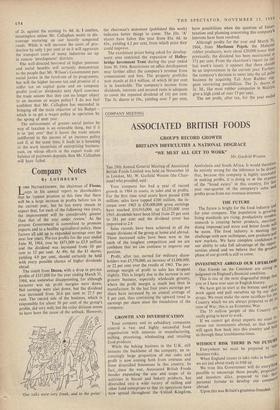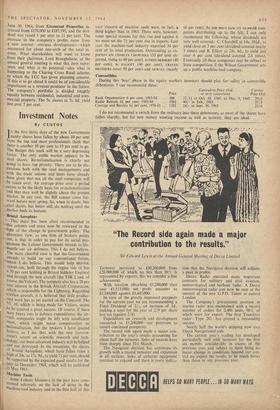Company Notes
By LOTHBURY
T ORD NETHERTHORPE, the chairman of Fisons, Lasays in his annual report to shareholders that he 'cannot promise at this time that there will be a large increase in profits before tax in the current year, but he has every reason to expect that, for each of the following two years, the improvement will be considerably greater than that of the year under review.' As the present Government is committed to promote exports and to a healthy agricultural policy, these factors all add up to expanded earnings over the next few years. Pre-tax profits for the year ended June 30, 1964, rose by £871,000 to £3.9 million and the dividend was increaSed from 10 per cent to 12 per cent. At 49s. 6d. the £1 shares, yielding 4.9 per cent, should certainly be held with every possible chance of higher dividends ahead.
The result from Decca, with a drop in pre-tax profits of £337,000 for the year ending March 31, 1964, was somewhat disappointing, for although turnover was up, profit margins were down. Net earnings were also down, but the dividend was increased from 26.6 per cent to 27.5 per cent. The record side of the business, which is responsible for about 50 per cent of the group's profits, did very well, but the radar division seems to have been the cause of the setback. However, 'Our talks were very frank, and to the.point.'
the chairman's statement (published this week) indicates better things to come. The 10s. 'A' shares have fallen this year from 81s. 6d. to 65s., yielding 4.2 per cent, from which price they could improve.
The exorbitant prices being asked for develop- ment sites restricted the expansion of Hailey- bridge Investment Trust during the year ended June 30, 1964. Restrictions on office development may further affect the company's revenue from commissions and fees. The property portfolio now stands at £6.4 million, of which 60 per cent is in leaseholds. The company's income from dividends, interests and secured rents is adequate to cover the repeated dividend of 141 per cent. The 5s. shares at 10s., yielding over 7 per cent,
have possibilities when the question of future taxation and planning concerning this companY's interests have been resolved.
Although profits for the year end March 31, 1964, from Merlimau Pegoh, the Malayan rubber producers, were about £20,000 lower than previously, the dividend has been maintained at 171 per cent. From the chairman's report (in our last week's issue), it appears that there should be an improvement in the current year. Further, the company's decision to enter into the oil palm business by acquiring Tali Ayer Rubber sug- gests interesting possibilities. The 2s. shares at 2s. 3d., like most rubber companies in Malaya, give a high yield of over 15 per cent.
The net profit, after tax, for the year ended
June 30, 1964, from Greencoat Properties in- creased from £170,000 to £185,195, and the divi- dend was raised 1 per cent to 11 per cent. The increase in the company's profits came from a new interest—overseas developments—which accounted for about one-sixth of the total in- come. What shareholders will want to know from their ?hairman, Lord Broughshane, at the annual general meeting is what this item repre- sents and what is its potential—also what is happening to the Charing Cross Road scheme, to which the LCC has given planning consent. If this is to go ahead it could be of considerable importance as a revenue-producer in the future. The company's portfolio is divided roughly equally between residential, industrial and com- mercial property. The 5s. shares at 7s. 6d. yield Just over 7 per cent.











































 Previous page
Previous page